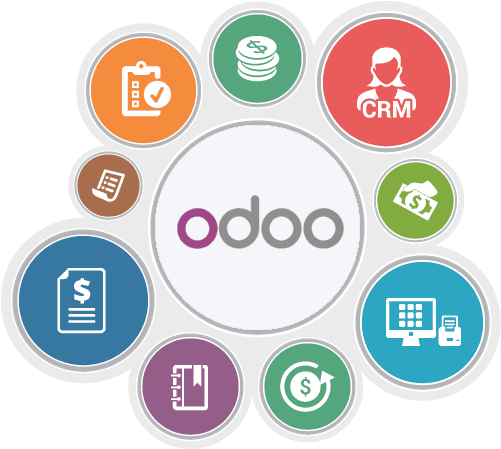What Is Odoo security?
Table of Contents
What is Odoo?
Odoo is an open-source ERP (Enterprise resource planning) system written in Python that is aimed to simplify managing the business operations of any size and kind of enterprise. Odoo customization may be completely completed by including a flexible framework and a well-ordered method for data transformation, as well as integrating an infinite number of modules that can be combined in any imaginable way. The availability of over 1000 modules enables any desired Odoo integration.
Odoo, in general, allows you to organize your store. You may change the features of your goods, the colors or sizes, set CTAs, and build your blog. Furthermore, it allows you to propose goods that are related to your consumers’ interests while increasing your sales.
Security mechanisms in Odoo
Odoo security is a system related to groups, and the groups are made up of users. A user can be a member of many groups. Furthermore, each user has different access rights/permissions to each model. It is maintained through the module name/security/ir.model.access.csv file, which specifies model-wide access control. User roles are provided by Odoo security.
Aside from manually managing access through custom code, Odoo provides two main data-driven mechanisms for managing or restricting data access.
Both methods are tied to individual users via groups: a person can join an unlimited number of groups, and security mechanisms are related to groups. This provides users with security features.

Source: Erpviet
>>> CLICK HERE TO LEARN MORE ABOUT Odoo Saas. How Can It Benefit Your Company?
What is the purpose of data security?
Data Breach Prevention
Only a software solution with the highest level of security will be able to safeguard sensitive information. It is necessary for the protection of employee information, customer information, transaction information, and other data.
- Data breaches may result in:
- Financial loss for the firm
- Loss of consumer trust
- Dragging the company into legal disputes
- Affecting the business
- Contributing to the business’s long-term viability.
If data is not safeguarded, it can be stolen, erased, or lost from the system. It might disrupt operations and bring all activity to a standstill. Keep illegal access and operations at bay.

Unauthorized access via hacking can have an impact on the website, computer systems, and network. It can lead to a range of issues. Because of these unforeseeable threats, data security is becoming increasingly vital.
Protecting client contact and other data
In an age of increased remote work, digitalization, and cybersecurity risks, protecting client information is a primary responsibility for many firms. Personal and contact information, as well as bank and credit card information, must be kept safe at all times by business owners and IT leaders, regardless of where employees access it.
Unauthorized data access or a data breach might have major ramifications for your company. It can not only harm your company’s brand and erode consumer trust, but it can also result in severe financial losses and even litigation. When it comes to securing consumer data, your IT staff and management must understand your company’s legal requirements.
Managing staff confidentiality
It is uncommon for a violation of confidentiality at work to occur on purpose, yet even an honest error can have serious implications. For example, if an employee leaves their business laptop on a train, any sensitive information saved on it becomes open for inspection by anybody. It might even be as simple as sending a private email to the incorrect recipient. We’ve all seen how simple it can be.
As an employee, the repercussions of breaching confidentiality agreements (external link) may result in termination. In more extreme circumstances, they may face a civil lawsuit if a third party implicated decides to file charges as a result of the breach’s consequences.

Managing the firm’s reputation
When you secure your customers’ personal information, you protect your company. By protecting client privacy, you can preserve your brand and market value, as well as your reputation, and avoid costly lawsuits.
While you may already have cybersecurity safeguards in place, there is a method to boost your trust in the security of your IT systems while avoiding potentially dangerous flaws that fraudsters may exploit. Implementing enterprise cybersecurity solutions can provide a more robust defense against these vulnerabilities, enhancing your ability to safeguard sensitive data across a larger organizational scale.
Penetration testing is a security technique that entails conducting a pre-agreed-upon cyber-attack on your IT assets. Penetration testing, also known as pen testing and ethical hacking, mimics a genuine cyber assault to identify possible backdoors and vulnerabilities that a real hacker may use to obtain access to your systems.

Why should you use Odoo security?
Odoo security has always worked hard to give its clients the greatest security features. Odoo releases a new version every year, to improve functionality regularly. This would enable Odoo to give the greatest company management and security features to its clients.
Odoo, as open-source software, collaborates with community groups all around the world. These community organizations, in collaboration with the Odoo team, aim to identify bugs and resolve any significant or little issues that a user may encounter. Proprietary software solutions will only receive help from paid employees of the organization, whereas Odoo security receives support from developers of different ages and geographical regions. This allows them to incorporate the most advanced and customized security features.
Odoo security has several important security features, including:
Odoo security supports backup and disaster recovery
With Odoo security, a user can be confident that all of its instances will be fully backed up for up to three months. Because data backup management is a critical component of data protection, every Odoo user may store and maintain the data for three months. Any instances lost within this period might be retrieved using this functionality.
Furthermore, Odoo security offers effective disaster management solutions. Odoo’s disaster management policies aid in the recovery of data as soon as possible without interfering with the organization’s operations.
Database Security
Odoo provides users with a secure database. Because database security is critical to the profitability and stability of any organization, this functionality will undoubtedly benefit yours. Odoo security keeps customer information in a separate database. Customers’ personal information is never disclosed to other parties. Odoo security also guarantees that access control rules are used to provide total control over private data.
Authentication using Two Factors
Two-factor authentication, or 2FA, may be used to strengthen the security of any account. This will provide the user with twofold protection. It is one of the most effective strategies for protecting accounts from hackers. Let us define two-factor authentication. It is just the preservation of sensitive information within the authenticator. We must exchange the code issued by the authenticator when we need to access or log in to the software. In the case of one-factor authentication, the hacker will only need to crack the password. If a person obtains the password by mistake, he will be able to access and misuse the data.
Password security is guaranteed.
Odoo security protects customer documents with a common password. In the event of a password loss, the client will be fully responsible for resetting the password.

Even if Odoo personnel need to access user accounts to make repairs or rectifications, they will do so with staff authorization. This implies that Odoo workers never have access to your user password. This shows that Odoo values the customer’s privacy.
Ensured safety Data Center Odoo
Odoo monitors physical data centers throughout the clock using security cameras. Staff access to this facility is likewise limited. Entry is restricted to technicians and is also monitored.
Credit card security
Odoo ERP never keeps your payment card information. Even if you use your credit or debit card for purchases, Odoo security does not save or keep the information. The main purpose of Odoo features is to act as a link between the user and the Payment Card Industry Acquirer.
Odoo Software Security
As previously said, because Odoo is Open Source software, the software code is always under the scrutiny of Odoo contributors and users. Bug detection, reporting, and debugging occur regularly, hence strengthening the software’s strength.
As previously stated, Odoo features include several security capabilities that may be utilized to increase data protection. With all of these advantages, Odoo users can simply manage all activities in a safe environment. Every year, Odoo releases new features and improves security aspects. If you use Odoo security, bug removal from the code is also a constant process.
How safe is Odoo?
When we talk about security, we may divide it into two sorts of security challenges. These include data loss (due to theft) and the inability to access your data. Let’s look more closely at these two security concerns.
Data loss (due to theft)
Employees that have access to the Odoo software and/or database provide the greatest security risk for data loss. Employees require access to data such as customer and product information daily. Because they have access to this data, they can also steal it. This can be accomplished through the use of an export, screen dumps, or event photography. There isn’t much that can be done about it, unfortunately. You can only restrict access to the most sensitive data (rights).
You can make Odoo’s access as secure as possible. For this, Odoo provides the following options:
- A password policy (minimum length) as well as a password strength test
- Two-step verification depending on time (2FA TOTP)
- Connection to LDAP and login
- Log in to an OAuth provider (Google, Microsoft, or Facebook).
Inability to access your info
Not having access to your data can be caused by a variety of factors, including software bugs, hardware failure, and larger-scale events such as catastrophes, viruses, cyberattacks, ransomware, or other intrusions. We can construct another dichotomy here. These are the security mechanisms in place to avoid this, as well as the options for recovering it if it has occurred.
Odoo security measures
Odoo has built-in protections on several fronts to reduce risk. When building software, safety is of the utmost importance (Odoo Secure by design). Odoo security is a member of the CSA’s Security Trust Assurance and Risk (STAR) program. Odoo Cloud servers are located in trustworthy data centers throughout the globe (e.g., OVH, Google Cloud), and all of them must meet Odoo’s physical security standards, which include:
- Restricted access, only approved data center staff have physical access.
- Controlling physical access using security badges or biometric security
- Security cameras monitor the data center sites 24 hours a day, seven days a week.
- Security staff are on-site 24 hours a day, seven days a week
 Odoo Backup Restore
Odoo Backup Restore
However, if something goes wrong, Odoo security may rely on backups.
- Odoo stores 14 complete backups of each Odoo database for up to three months: one every seven days for seven days, one every week for four weeks, and once every month for three months.
- Backups are replicated in at least three distinct data centers across at least two continents.
- You may also download manual backups of your live data from the Odoo. sh backend at any time. We do not recommend downloading a backup since it poses a security risk (loss or theft).
- Hardware failover: For services hosted on bare metal, where hardware failures are likely, Odoo security has integrated local hot standby replication, with monitoring and a five-minute manual failover.
- Disaster recovery: In the event of a total outage, with a data center fully offline for a lengthy period, prohibiting failover to a local hot standby (according to Odoo, this is the worst-case situation), Odoo security has the following objectives:
- RPO (Recovery Point Objective) is equal to 24 hours. This means you might be out of work for up to 24 hours if the data cannot be retrieved and we need to restore your most recent daily backup.
- RTO (Recovery Time Objective) is equal to 24 hours. If a crisis hits and a data center goes fully down, now is the time to restore service in another data center.
- Odoo security does this by continuously monitoring daily backups and replicating them in many places across multiple continents. To deploy the services on a new hosting location, Odoo security uses automatic provisioning. Restoring the data based on the previous day’s backups can then be completed in a matter of hours (for the largest clusters).
- Odoo security frequently uses both daily backups and provisioning scripts for day-to-day operations, ensuring that both components of the disaster recovery process are continually checked.
Conclusion
This article has shown why data security is important and how the Odoo solution protects your company’s data security. We may deduce that Odoo security is doing all possible to keep your data safe. It has also implemented adequate security measures to make the Odoo systems as secure as possible. Be aware that there is no such thing as 100 percent security. There will always be dangers. You may reduce these risks by planning ahead of time and knowing what to do if something goes wrong.
Contact an experienced Odoo installation partner like BSS Commerce, who can tailor the modules to match your individual needs, if you want to know more about how Odoo may help your business. BSS Commerce is a full-service company that can help you overcome issues and problems at any moment. Our services can provide everything you’ll need to get your Odoo shop up and running. Odoo is a well-known company management software for both small and large companies. BSS Commerce offers all of the Odoo services you need at a fair price for your Odoo shop.

>>> For additional details for Odoo services, take a look our Odoo development landing page!
